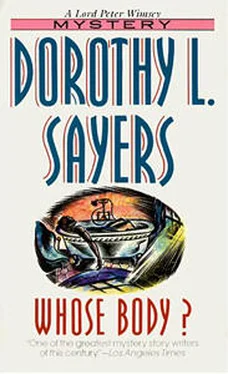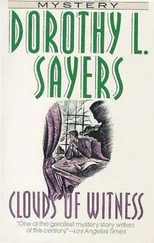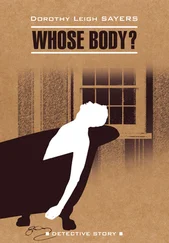«Good dog,» said Lord Peter.
Encouraged by this, the dog gave a sudden ridiculous gambol and barked, its ear tossed inside out over its head.
«Heel,» said the man in velveteen, violently. The animal sidled up, ashamed.
«Fool of a dog, that,» said the man in velveteen; «can't keep quiet. Too nervous, my lord. One of old Black Lass's pups.»
«Dear me,» said Peter, «is the old dog still going?»
«No, my lord; we had to put her away in the spring.»
Peter nodded. He always proclaimed that he hated the country and was thankful to have nothing to do with the family estates, but this morning he enjoyed the crisp air and the wet leaves washing darkly over his polished boots. At Denver things moved in an orderly way; no one died sudden and violent deaths except aged setters — and partridges, to be sure. He sniffed up the autumn smell with appreciation. There was a letter in his pocket which had come by the morning post, but he did not intend to read it just yet. Parker had not wired; there was no hurry.
* * *
He read it in the smoking-room after lunch. His brother was there, dozing over the Times — a good, clean Englishman, sturdy and conventional, rather like Henry VIII in his youth; Gerald, sixteenth Duke of Denver. The Duke considered his cadet rather degenerate, and not quite good form; he disliked his taste for police-court news.
The letter was from Mr. Bunter.
110, Piccadilly,
W.I.
My Lord:
I write (Mr. Bunter had been carefully educated and knew that nothing is more vulgar than a careful avoidance of beginning a letter with the first person singular) as your lordship directed, to inform you of the result of my investigations.
I experienced no difficulty in becoming acquainted with Sir Julian Freke's man-servant. He belongs to the same club as the Hon. Frederick Arbuthnot's man, who is a friend of mine, and was very willing to introduce me. He took me to the club yesterday (Sunday) evening, and we dined with the man, whose name is John Cummings, and afterwards I invited Cummings to drinks and a cigar in the flat. Your lordship will excuse me doing this, knowing that it is not my habit, but it has always been my experience that the best way to gain a man's confidence is to let him suppose that one takes advantage of one's employer.
(«I always suspected Bunter of being a student of human nature,» commented Lord Peter.)
I gave him the best old port («The deuce you did,» said Lord Peter), having heard you and Mr. Arbuthnot talk over it. («Hum!» said Lord Peter.)
Its effects were quite equal to my expectations as regards the principal matter in hand, but I very much regret to state that the man had so little understanding of what was offered to him that he smoked a cigar with it (one of your lordship's Villar Villars). You will understand that I made no comment on this at the time, but your lordship will sympathize with my feelings. May I take this opportunity of expressing my grateful appreciation of your lordship's excellent taste in food, drink and dress? It is, if I may say so, more than a pleasure — it is an education, to valet and buttle your lordship.
Lord Peter bowed his head gravely.
«What on earth are you doing, Peter, sittin' there noddin' an' grinnin' like a what-you-may-call-it?» demanded the Duke, coming suddenly out of a snooze. «Someone writin' pretty things to you, what?»
«Charming things,» said Lord Peter.
The Duke eyed him doubtfully.
«Hope to goodness you don't go and marry a chorus beauty,» he muttered inwardly, and returned to the Times .
Over dinner I had set myself to discover Cummings's tastes, and found them to run in the direction of the music-hall stage. During his first glass I drew him out in this direction, your lordship having kindly given me opportunities of seeing every performance in London, and I spoke more freely than I should consider becoming in the ordinary way in order to make myself pleasant to him. I may say that his views on women and the stage were such as I should have expected from a man who would smoke with your lordship's port.
With the second glass I introduced the subject of your lordship's enquiries. In order to save time I will write our conversation in the form of a dialogue, as nearly as possible as it actually took place.
Cummings: You seem to get many opportunities of seeing a bit of life, Mr. Bunter.
Bunter: One can always make opportunities if one knows how.
Cummings: Ah, it's very easy for you to talk, Mr. Bunter. You're not married, for one thing.
Bunter: I know better than that, Mr. Cummings.
Cummings: So do I — now, when it's too late. (He sighed heavily, and I filled up his glass.)
Bunter: Does Mrs. Cummings live with you at Battersea?
Cummings: Yes; her and me we do for my governor. Such a life! Not but what there's a char comes in by the day. But what's a char? I can tell you it's dull all by ourselves in that d-d Battersea suburb.
Bunter: Not very convenient for the Halls, of course.
Cummings: I believe you. It's all right for you, here in Piccadilly, right on the spot as you might say. And I daresay your governor's often out all night, eh?
Bunter: Oh, frequently, Mr. Cummings.
Cummings: And I daresay you take the opportunity to slip off yourself every so often, eh?
Bunter: Well, what do you think, Mr. Cummings?
Cummings: That's it; there you are! But what's a man to do with a nagging fool of a wife and a blasted scientific doctor for a governor, as sits up all night cutting up dead bodies and experimenting with frogs?
Bunter: Surely he goes out sometimes.
Cummings: Not often. And always back before twelve. And the way he goes on if he rings the bell and you ain't there. I give you my word, Mr. Bunter.
Bunter: Temper?
Cummings: No-o-o — but looking through you, nasty-like, as if you was on that operating table of his and he was going to cut you up. Nothing a man could rightly complain of, you understand, Mr. Bunter, just nasty looks. Not but what I will say he's very correct. Apologizes if he's been inconsiderate. But what's the good of that when he's been and gone and lost you your nights rest?
Bunter: How does he do that? Keeps you up late, you mean?
Cummings: Not him; far from it. House locked up and household to bed at half past ten. That's his little rule. Not but what I'm glad enough to go as a rule, it's that dreary. Still, when I do go to bed I like to go to sleep.
Bunter: What does he do? Walk about the house?
Cummings: Doesn't he? All night. And in and out of the private door to the hospital.
Bunter: You don't mean to say, Mr. Cummings, a great specialist like Sir Julian Freke does night work at the hospital?
Cummings: No, no; he does his own work — research work, as you may say. Cuts people up. They say he's very clever. Could take you or me to pieces like a clock, Mr. Bunter, and put us together again.
Bunter: Do you sleep in the basement, then, to hear him so plain?
Cummings: No; our bedroom's at the top. But, Lord! what's that? He'll bang the door so you can hear him all over the house.
Читать дальше












